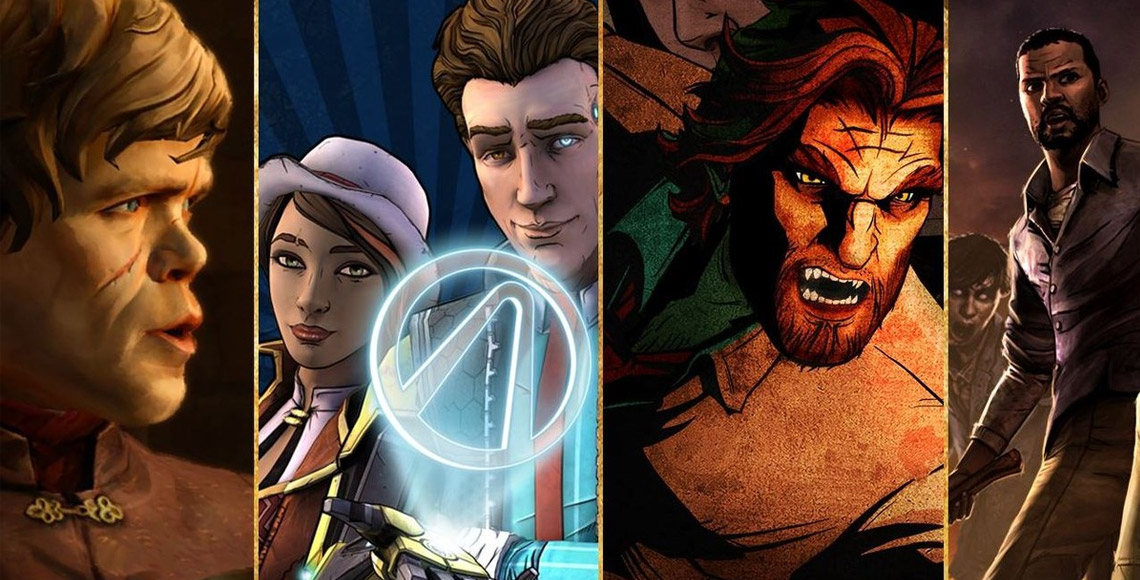
It’s been more than a whole year now since, on 21 September 2018, a truly tragic thing happened. Practically the entire staff of employees working at the studios of veteran episodic-drama developer Telltale Games was suddenly and brutally let go. Without any official forewarning, workers were asked to exit the building; each unexpectedly finding themselves with no job, no severance and only nine more days of health insurance. Whilst a handful of employees were initially kept on to help finish titles that were mid-development, these too were soon laid off – also without severance. It was a deeply sad time; not just in light of the horrendous manner in which the company’s dedicated staff members were let go, but in light of the idea that we as gamers might have never again been able to play another release with the subtitle ‘A Telltale Series’. Thankfully, after LCG Entertainment’s recent acquisition of Telltale’s assets, the company has openly announced its commitment to preserving and continuing the episodic-developer’s iconic legacy.
Episodic drama games are of course not a genre exclusive to Telltale. That being said, the developer most certainly boasted its own inimitable style to producing them; one born of courageous ambition, imaginative writing and an unrelenting dedication to source material. With that in mind, we rank 10 of the developer’s best; tracking the highs and lows that together illustrate why Telltale’s incredible legacy is one well worth continuing.
This article was meant to be as spoiler-proof as possible, but a few minor ones may have crept their way through so stay vigilant…
#10. Game of Thrones (2014-15)
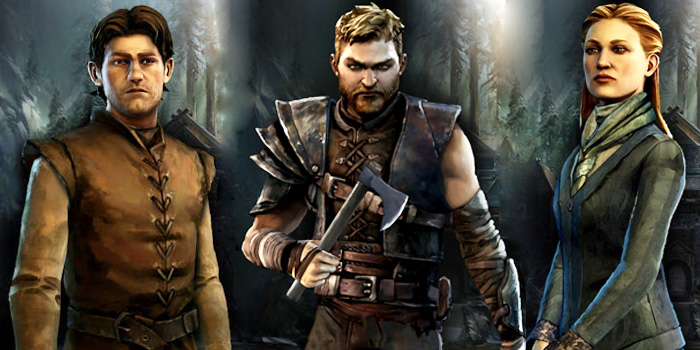
Acquiring the rights to adapt popular entertainment franchises into narrative-focused, episodic games became the central tenet of Telltale’s development scheme pretty much straight after the release of Jurassic Park: The Game (*shudder*). But landing the license to produce a game based on HBO’s universally-watched fantasy series was ‘a huge deal’ in more ways than one.
Fans’ excitement-gauges were dinging madly over the idea of being made an active participant in a story set in George RR Martin’s grisly world of turmoil and tyranny. And after Telltale revealed members of the HBO cast would be lending both their likenesses and voices to the game, those excitement gauges started to reach near-critical levels. In hindsight, it was practically inevitable that the end result wouldn’t be able to meet such vigorous expectation.
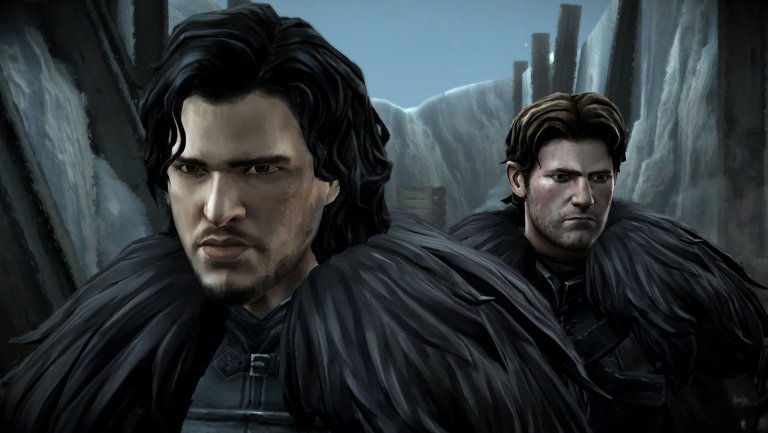
While adapting a franchise that sported such an enormous fan-base succeeded in attracting a large number of players – including many that were otherwise unfamiliar or uninterested in the episodic-drama genre – it also meant the finished product, quite simply, had far too much to live up to. The story and its characters were pretty solid when analysed objectively, but were inevitably diminished by the sheer dramatic might of the series they were trying to imitate. Even bringing in familiar faces/voices couldn’t quite help, with many of them only appearing in detached cameo roles, and as fairly awkward imitations of their live-action counterparts. The series was also criticised for some graphical glitches, frame-rate issues and an unbearably lengthy release schedule.
Despite all this negativity, however, the experience is still most certainly an enjoyable one overall; with the Forrester family’s plight offering up a Telltale-tastic selection of exciting, tense and genuinely emotional moments. The ending may have been a big fat anticlimax (foreshadowing the TV show’s final season a little) but the journey there was still worth taking…just.
#9. The Walking Dead: A New Frontier (2016-17)
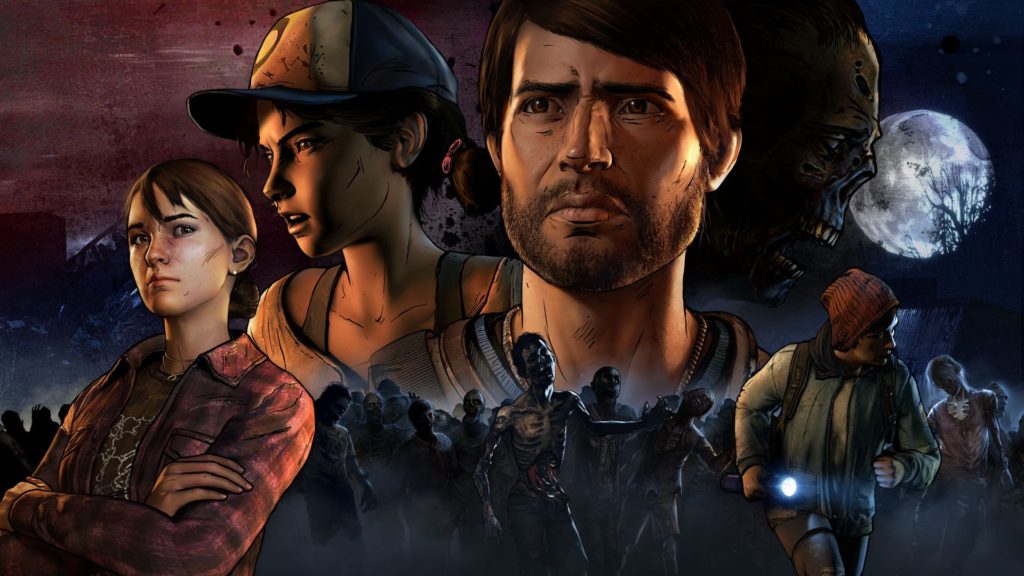
After Season 2‘s shocking finale polarised fans, Telltale’s decision to shift the Walking Dead series’ central narrative focus to an entirely new set of characters was a bold one, to say the least. The result was an intriguing, if somewhat disappointing, entry in the franchise.
There’s no denying Javi was a strong lead; interesting and easy to empathise with, and the studio’s dialogue writers were definitely on top form. Unfortunately, the relegation of Clementine to a mysterious supporting role for much of the series frustrated many due to its effective nullification of arguably one of the most dramatic and difficult choices any Telltale game has ever presented. Instead of being granted any semblance of genuine impact, Season 2‘s climactic moral dilemma and the wealth of endings that branched from it were dealt with only in a series of short, save-specific flashbacks. While this did serve to provide at least some form of closure to the previous season’s events, it nevertheless felt to most like an offensively cheap way of ‘tying up loose ends’.
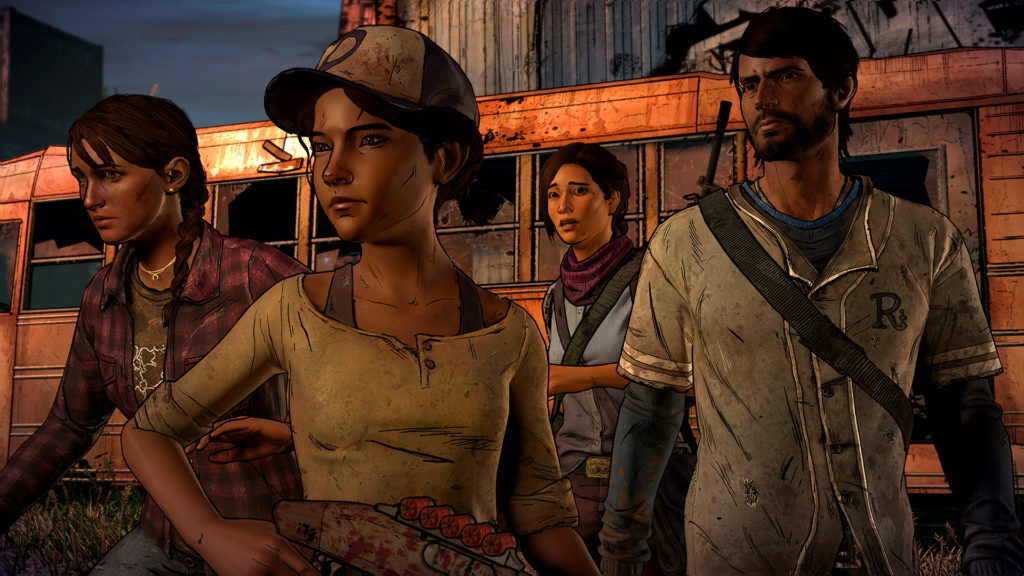
New Frontier‘s extensive cast of new characters – in a sense carrying on a franchise-trend – featured a balanced mix of the ‘fresh and interesting’ and the ‘unapologetically generic’. But the true point of frustration was found in the unjustifiably meagre length of the series’ episodes, with some barely even making it past the hour mark.
Still, the game most certainly proved the franchise continued to hold solid narrative clout and that Clem remained an enduringly fascinating character.
#8. Sam & Max Trilogy (2006-2010)
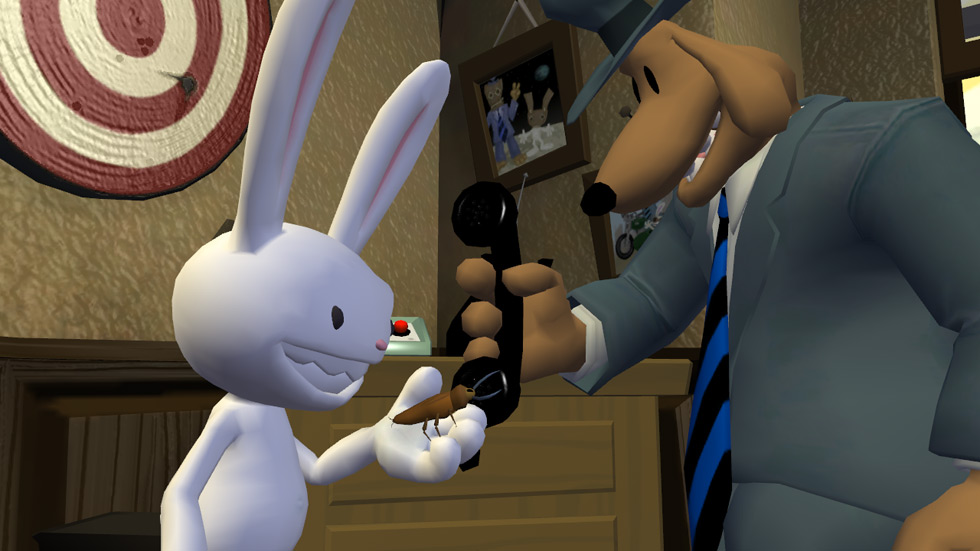
Before The Walking Dead‘s success cemented the studio’s patented dramatic formula, Telltale were best known for their work on keeping the ‘classic adventure game’ genre alive. After a sequel to one of LucasArts’ most beloved adventure titles, Sam & Max Hit the Road (1993), was cancelled, former LucasArts employees banded together to form their own company; one dedicated to proving classic adventure titles still held a place in the current climate. They called this company ‘Telltale Games’ and, after a series of fairly successful placeholder titles that were released to keep the company afloat while they waited for LucasArts’ apparently non-negotiable hold on the Sam and Max license to expire, the studio found acclaim and fame with their release of Sam and Max: Season One (later renamed Sam & Max Save the World) in 2006.
Based on comic book characters created by Steve Purcell, the series features laid-back anthropomorphic dog Sam and hyperkinetic, borderline-psychopathic ‘rabbity-thing’ Max as a team of vigilante private investigators who spend their time solving overtly preposterous cases and conspiracies. It’s puzzles may not be as complex or intuitive as the classic adventures it was designed as a tribute to; but the vibrant visuals, charming gameplay and hilariously offbeat satiric humour make this series of games a joy to play through. Definitely check them out if you like your jokes ‘wacky’…with a capital ‘W’.
#7. Batman (2016) / Batman: The Enemy Within (2017-18)
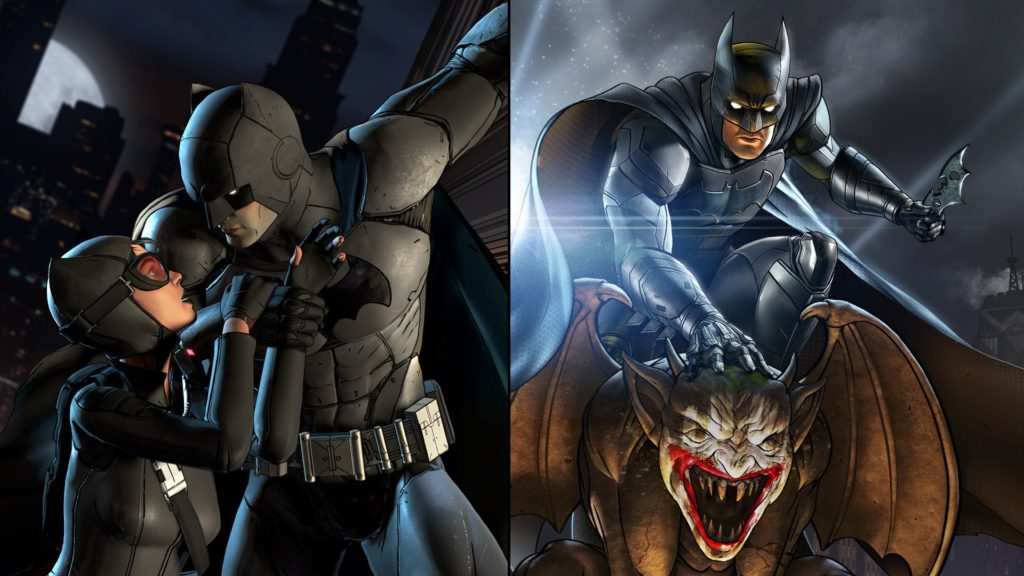
Unlike the majority of Telltale’s prior adaptations, which mostly consisted of franchises that had little-to-no presence in the video-game industry, DC Comic’s Batman was a character players had seen many iterations of over the years. With such a broad following of comic, film and video-game fans, many (myself included) were sceptical about Telltale’s decision to focus their talents on such a done-to-death franchise. My own scepticism, however, melted away practically within the opening 2 minutes of the first episode. Gotham and its Watchful Protector proved an undeniably perfect fit for Telltale’s gritty, graphic-novel visuals and punchy, stylised QTE action-sequences.
Furthermore, the maturity with which the developer handled the eponymous character – and in particular his famously inscrutable alter-ego – ensured their version of the Dark Knight was one that somehow felt both intriguingly fresh and comfortably familiar at the same time.
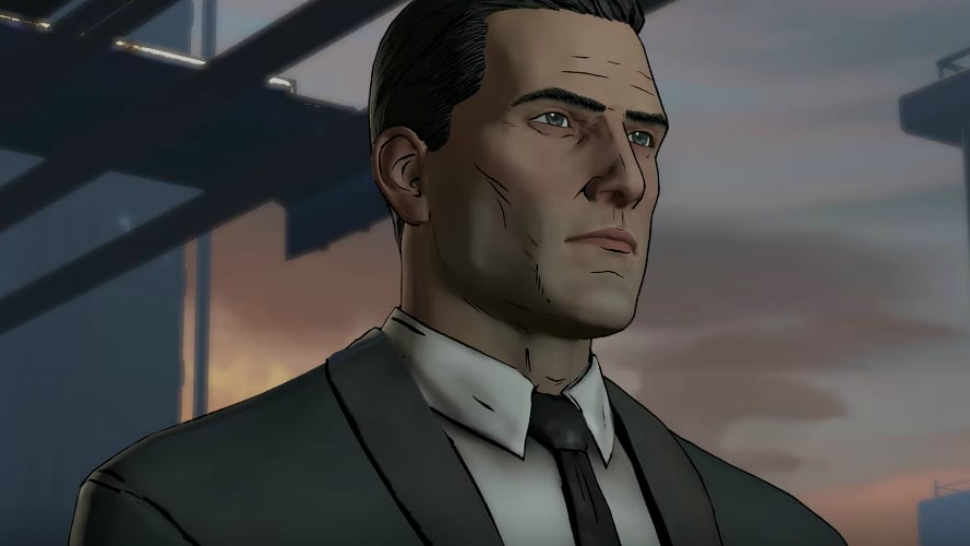
Even though the first series’ opening episode proved by far its strongest overall, the developer proceeded to tell a distinctly interesting and engaging tale; one that – in rather ironic fashion – made uniquely intelligent use of the source material by going almost directly against it in places. In doing this, Telltale were able to put a new spin on recognisable characters; thereby essentially redefining how they fit into the Caped Crusader’s story. Whilst one or two of these alternate representations proved a little difficult to accept for long-time fans, the bravery Telltale displayed in taking such creative liberties was certainly commendable nonetheless.
Unfortunately, the series still suffered from some slight pacing issues and frequently awkward dialogue – not to mention a particularly inflamed case of ‘do-my-choices-actually-matter-itus’. The Enemy Within (Batman‘s second season), however, strove to address some of these issues by telling a more dramatic, if somewhat less ‘personal’, story, whilst ensuring your choices had a more noticeable impact on the experience.
#6. Tales of Monkey Island (2009)

LucasArts’ Monkey Island titles are arguably the most well-known members of the classic adventure genre. Ron Gilbert and his team provided a truly memorable experience by mixing intoxicating charm and off-the-wall humour with intelligent puzzle gameplay that often demanded careful, outside-the-box thinking. With the developer’s principled goal being the preservation of the ‘classic adventure game’, adapting such a richly beloved retro franchise like Monkey Island was practically a no-brainer for Telltale.
Tales of Monkey Island comes from a time before The Walking Dead, which means gameplay revolves around exploration, puzzle-solving and self-referential humour – with in-game conversations primarily used only to outline objectives and provide laughs. That being said, Tales of Monkey Island nevertheless stands as a clear example of how Telltale had proven their unique storytelling capabilities well before Clementine and Lee came along. Obviously this series carries nowhere near the emotional weight of future productions; but intelligent writing, effective characterisation and some excellent pacing make this adventure a genuine treat to be a part of.
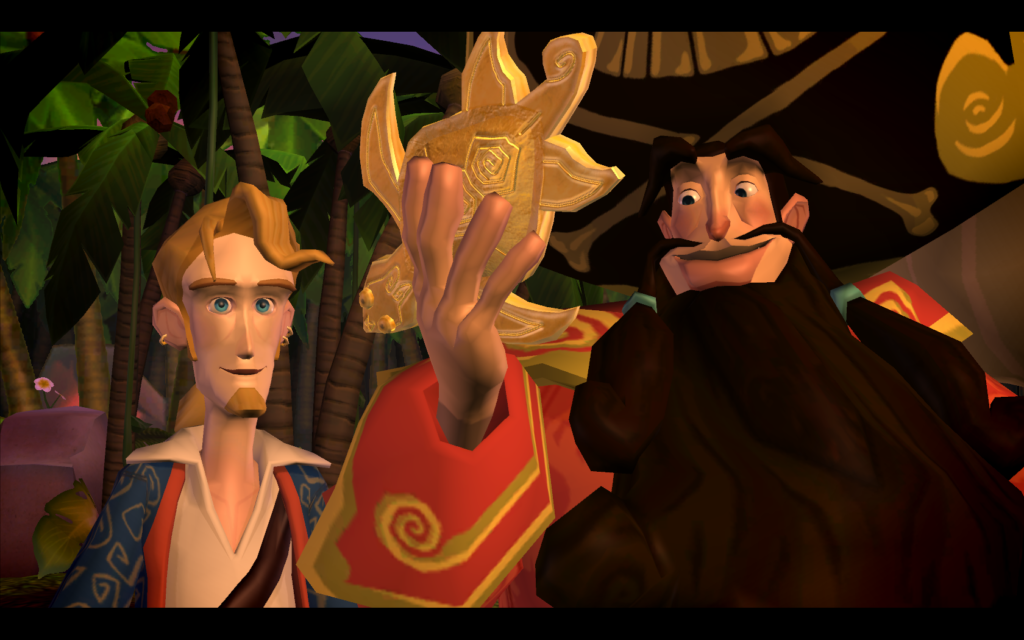
Beyond its narrative strengths, however, the game’s real appeal lies in the inventive puzzle design; which – making its parent franchise proud – featured a balanced mix of the challengingly complex and the deceptively (in a funny way) simple.
Some of the solutions, admittedly, could be pretty convoluted and often practically forced the player to resort to the notorious ‘try everything on everything’ technique. But, considering ‘trial-and-error’ gameplay itself formed a large part of the puzzle-solving dynamic in classic adventure games, this in turn allowed the experience to feel even more nostalgic. Besides, there’s nothing quite like the feeling of stepping away from a puzzle you’re stuck on, only to come back later with a fresh outlook and suddenly realise the solution was right under your nose the whole time. God bless you my little Pyrite Parrot!
#5. Marvel’s Guardians of the Galaxy (2017)
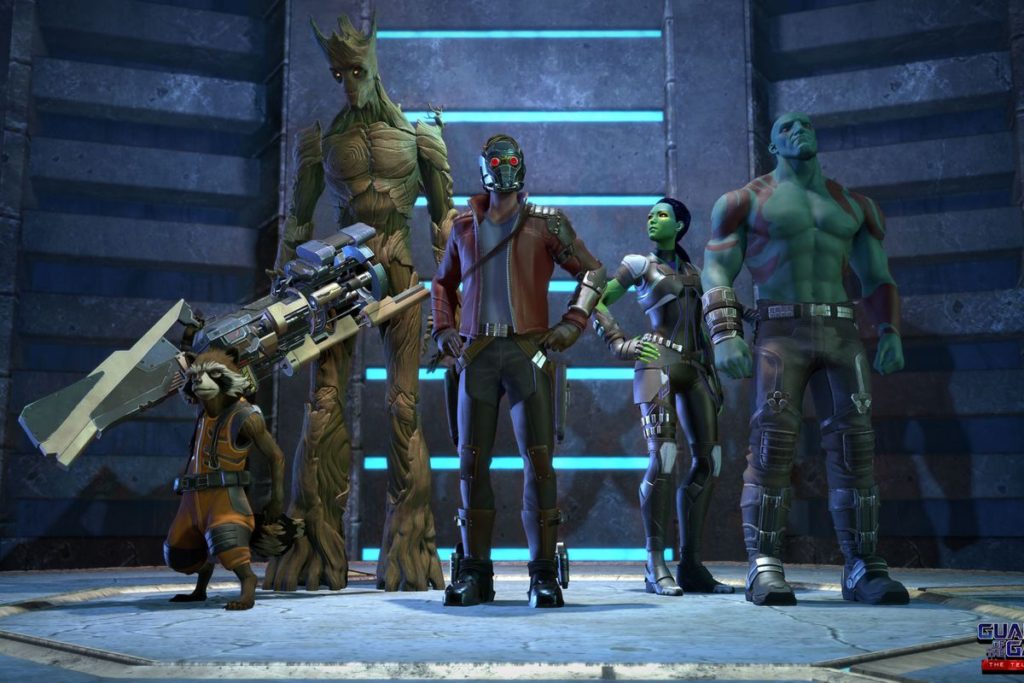
After making great use of DC’s Batman license to tell an appropriately dark and suspenseful story, Telltale soon ended up partnering with Marvel in order to leverage their expertise towards one of that company’s lighter and more upbeat comic franchises. Releasing in close proximity to the film’s sequel, Telltale’s Guardians of the Galaxy represented a measured attempt to carefully marry the misfit-heroes’ comic and big-screen iterations; thereby creating a game that could be accessible to all types of Guardians fans – newcomers and veterans alike.
The studio looked to the comics for inspiration on its visual style, character relationships and the focus of its original story, and to the films mostly for direction regarding the characters’ mannerisms, comedic timing and – most importantly – how using the right 70s backing track can make an action sequence about a hundred-times more exhilarating.
Where Batman was predominantly about suspense and moral ambiguity, Guardians was all about relentless, unfettered fun. As the first episode opened with Starlord bopping to The Buzzcock’s Why Can’t I Touch It?, any Guardians fan could instantly tell they were in for a real treat. And in addition to the major action sequences providing ridiculous new levels of entertainment, the developer still made sure to place a sincere focus on telling their own unique story. The game technically took a little while to really find its feet, but once the player had warmed to each of the characters and got used to the somewhat uncomfortably frequent loading points, the experience swiftly started to shape up.
Even the initially confusing decision to have the Guardians defeat their most powerful adversary within the opening act actually soon proved itself a smartly intuitive way of focusing the story purely on the group’s signature ‘family’ dynamic, and how the accomplishment of the goal that held them all together might in fact challenge such a dynamic.
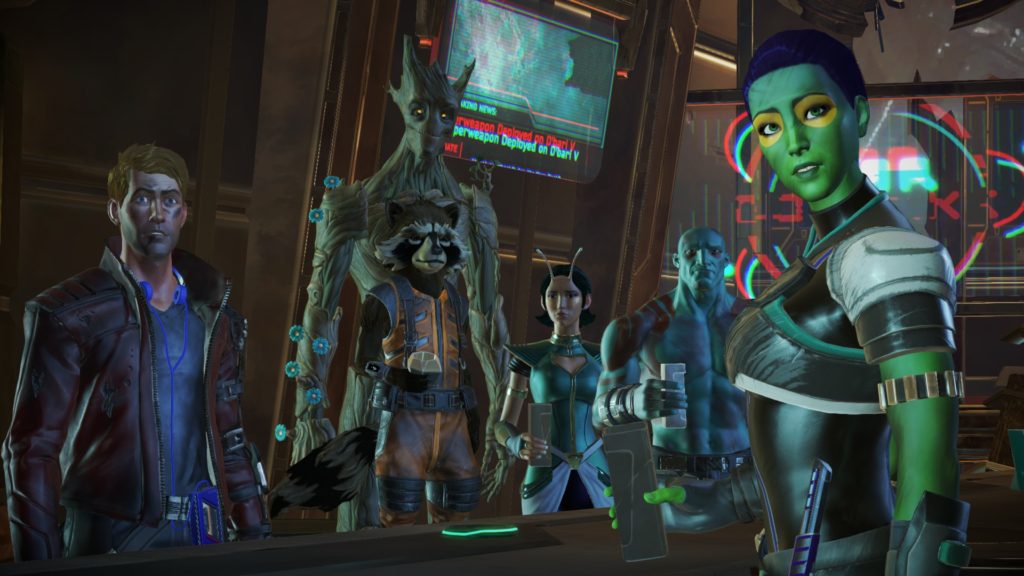
The story, while certainly decent, wasn’t especially compelling by Telltale’s typical standards; but the studio’s penchant for character development and allowance for players to make decisions that could directly affect the Guardians’ relationships with each other ensured the narrative experience remained involving, entertaining and occasionally even fairly emotive. And, on top of all that, the game was just so, so fun.
#4 The Walking Dead: The Final Season (2018/19)
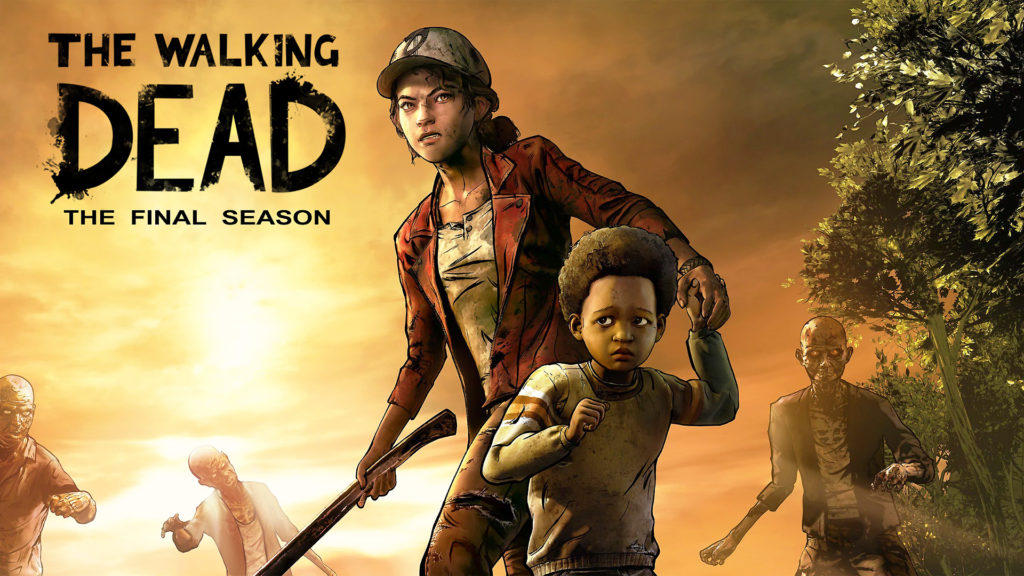
Telltale’s sudden and tragic shut-down in the middle of The Walking Dead: The Final Season‘s development was terrifying. The idea that one of gaming’s most fascinating, extensively developed characters might not be gifted the honour of an official conclusion was an utterly devastating one. Thankfully, Skybound Entertainment stepped in to help ensure Clementine could receive the ending she, and her creators, deserved.
Having worked closely with Telltale throughout the narrative development of The Walking Dead‘s four seasons, the newly-formed games divisions of Robert Kirkman’s own publishing company seemed ideally placed to catch the falling baton. Together with a number of Telltale employees – many of whom made personal sacrifices to ensure work on The Final Season could be completed – Skybound officially released the final episode of Telltale’s seven-year running Walking Dead saga on March 26 2019. And my, what a final episode it was.
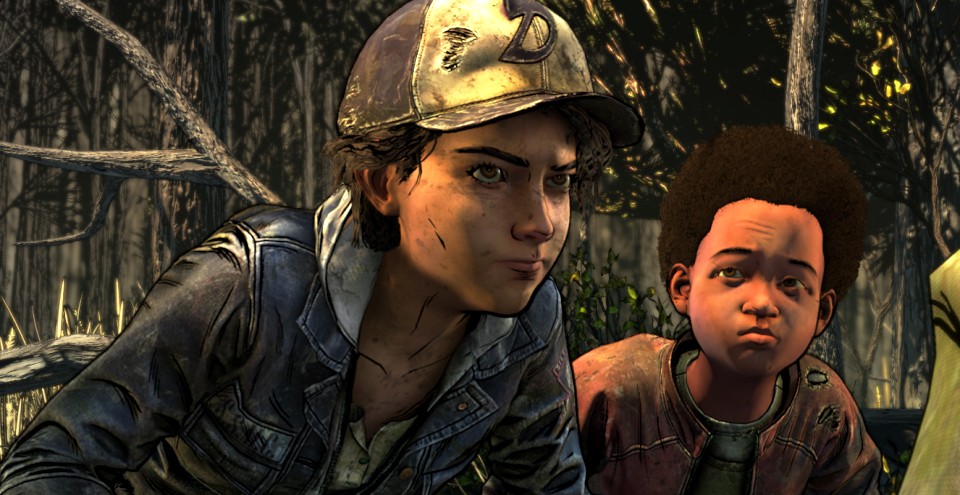
As a sequel to A New Frontier, The Walking Dead: The Final Season didn’t have a huge amount to live up to. But as an official conclusion to the series, the game had a much more important job ahead of it. The season’s return to the first game’s narrative dynamic – where Lee had to teach Clem how to survive in the dangerous and unpredictable world they’d suddenly found themselves in – was the perfect tactic. Indeed, as the words “A.J is always listening” appear in the corner of the screen the player is made instantly aware of what this season is going to be about. Just as Lee set his example for her, it was now Clem’s job to show A.J how to survive in a world where dropping your guard or exercising misplaced sentiment can get you killed.
The difference between the two dynamics is a vitally significant one, however. Whilst Clementine had known a normal life with her real parents before Lee found her in that treehouse, A.J has never known any world except for the one he lives in now, and Clem is the only person he has ever been truly close to. Where part of Lee’s job was to force young Clementine to rethink traditional notions of trust and compassion in order to accommodate for the new dangers that faced them, the important aspect of Clem’s job was to somehow introduce these concepts to a six-year old who would rather spin the cylinder of his loaded revolver than play with an actual toy.
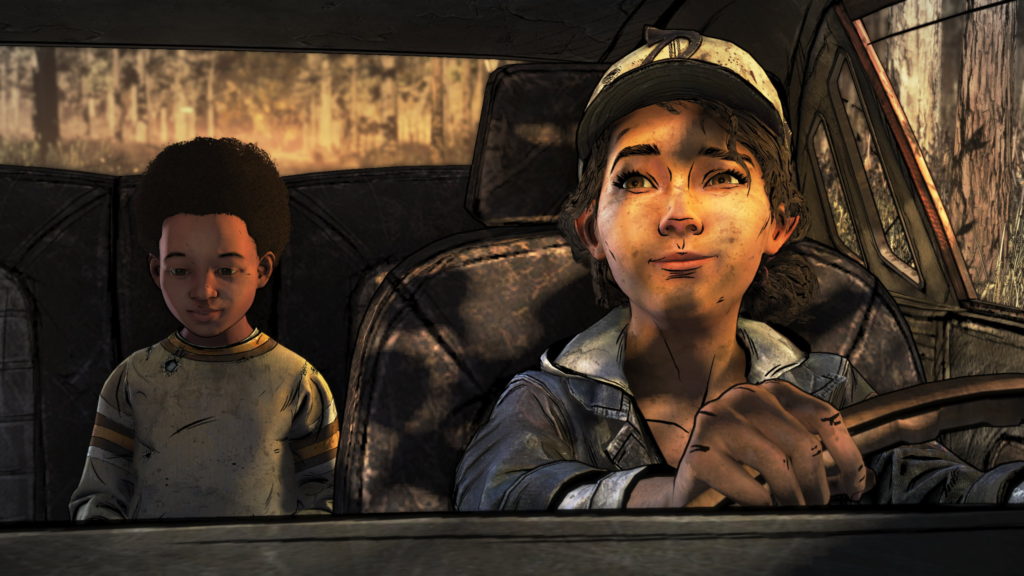
Of course the game still suffers from traditional issues that tended to plague many of Telltale’s releases; such as underdeveloped minor characters, narrative paths that serve mostly as ‘padding’ for the story and unnecessarily elaborate free-roam segments that tend to negatively impact each episode’s pacing.
But, regardless of the occasional uphill-struggle, the journey to that intensely emotional final episode is easily one well worth taking for any Clementine fan. And while the integrity of Clem’s actual ending itself rests entirely on player perception, there’s no denying that Skybound and Telltale together succeeded in providing a conclusion worthy of both the character and the talented developers that spent 7 years of their illustrious careers making us care about her.
#3. Tales From the Borderlands (2014-15)
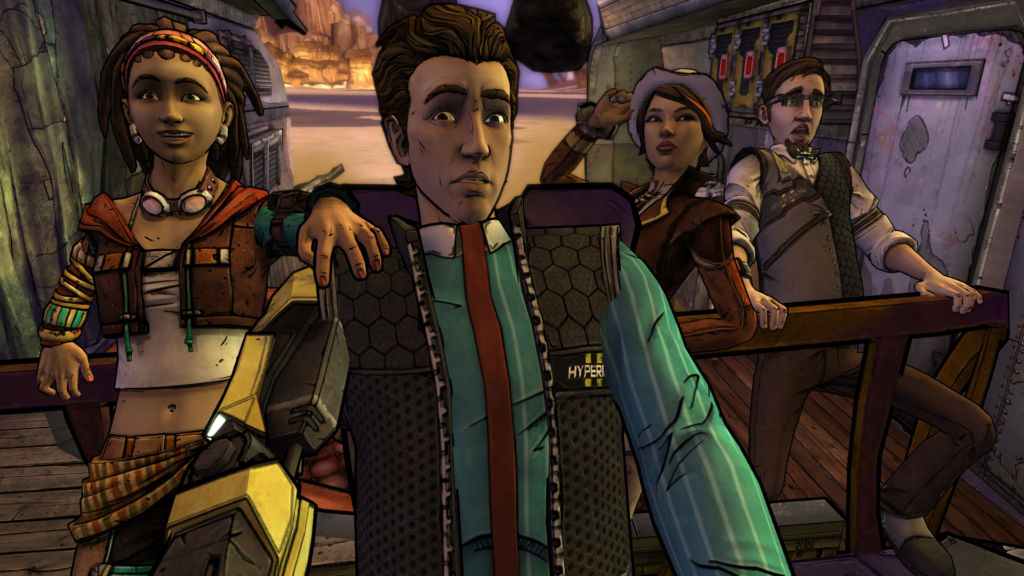
To the average onlooker, the Borderlands‘ franchise seemed like an unusual platform on which to build a structured, narrative-focused adventure. But to Telltale the wild and wacky world of Pandora clearly represented something special: an opportunity to make a return to their classic comedy roots. Tales from the Borderlands followed the same cinematic formula as the Walking Dead, but also peppered it with the witty, offbeat, charming humour that helped make some of the studios’ earlier adventure games so enjoyable. And the result turned out to be something very special indeed.
Tales from the Borderlands is by far Telltale’s funniest game. Guardians of the Galaxy and Minecraft: Story Mode can easily induce some smiles. Sam and Max and Monkey Island likewise encourage frequent chuckles. But the studios’ Borderlands adaptation is simply chock-full of genius laugh-out-loud moments.
What made this game especially unique, in fact, was that its comedy was not only found in the dialogue; Telltale clearly had great fun playing around with some of the mechanics embedded in their now-famous gameplay model. For instance, while exploring an area as dorky executive Rhys, the player could use his cybernetic eye to further analyse objects in the environment; being rewarded for exploration with access to a range of pretty great jokes they wouldn’t otherwise see.
Similarly, while QTE’s could often feel a little intrusive in previous games – sometimes serving to sap the action of its momentum – in Borderlands the ‘stop-start’ feel created by sequences that featured intermittent prompts seemed to lend itself perfectly to the adventure’s comedic style and timing.
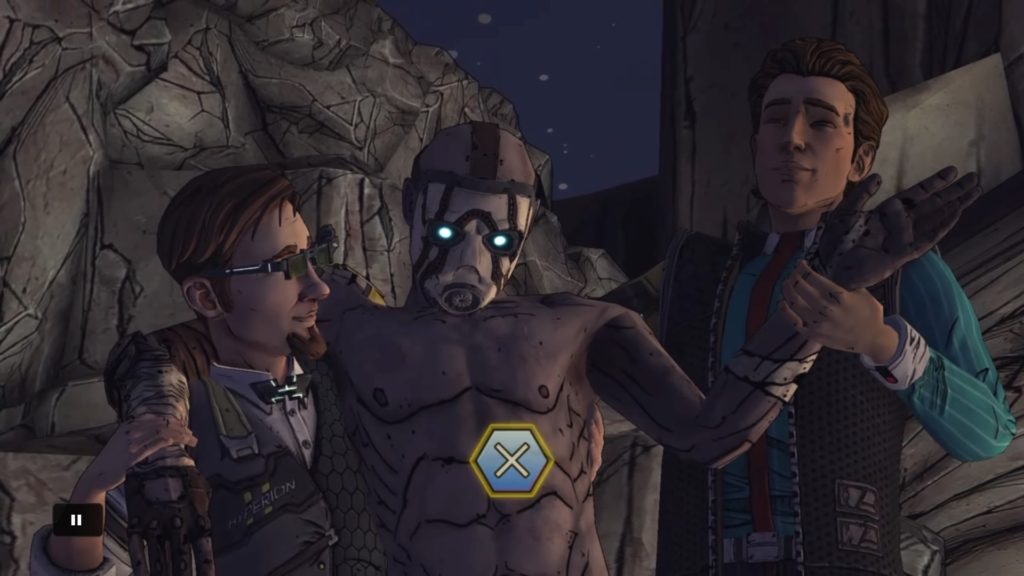
And it wasn’t just their gameplay model that Telltale had fun playing around with, the developer also very effectively parodied some of their patented narrative techniques as an intelligent way of producing even more laughs. It’s no question that some of the game’s best comedy moments were found in the little pranks the writers played on us using the game’s genius unreliable-narrator technique. Throughout the series, protagonists Rhys and Fiona take turns telling parts of their intertwined story, and each frequently enjoyed taking creative liberties with the other’s roles or behaviour in that story – either in the form of hyperbolic embellishments or just some good old-fashioned piss-taking.
In addition to providing endless laughs, however, the game also served to tell a genuinely compelling story; one driven at a masterful pace by a relentlessly entertaining cast of characters, both old and new.
Quite honestly, the only negative I could possibly think of relates to the havoc the game wreaked on my facial muscles; which later ached tremendously as a result of the fact that I had spend the entire 10-hour experience with a gigantic smile plastered across my face.
#2. The Walking Dead: Season One (2012) and Season Two (2013-14)
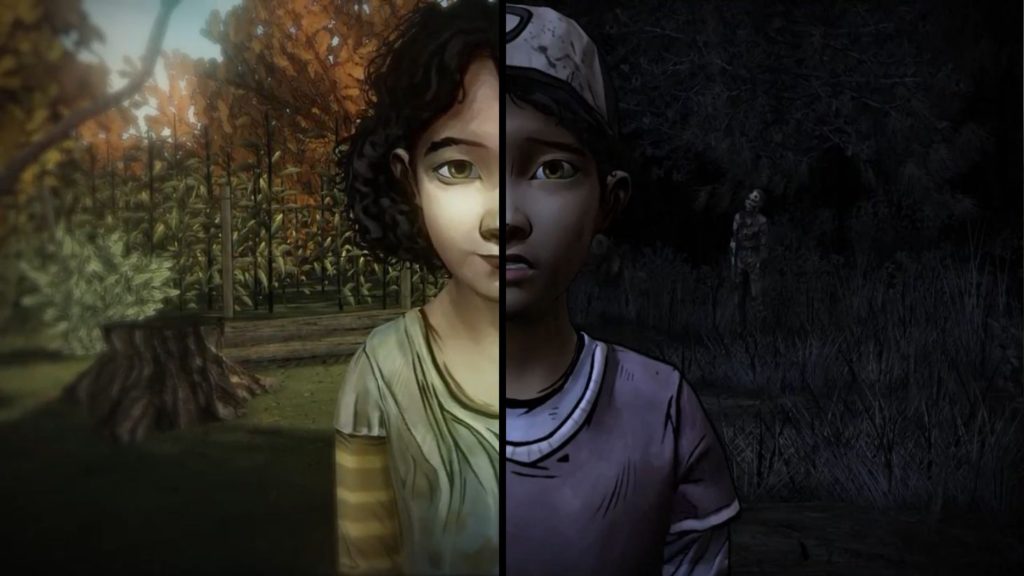
Well here we are, at the franchise that changed everything, not just for Telltale but for the episodic genre in general. Of course it is technically cheating listing these two as a single entry, but it just seems appropriate to view Seasons One and Two of The Walking Dead as a single, complete experience. Together, the games tell the captivating story that is Clementine’s physical, psychological and emotional journey from naive, innocent child to strong, determined and self-sufficient woman. She may be only fifteen by the time the second season’s finale draws to its climactic close but she’s already endured more than enough pain, tragedy and heartbreak to fill a lifetime.
Immediately upon its release in 2012, The Walking Dead: The Game enchanted audiences and critics alike with its deeply involving and emotionally riveting story; one built on strong character development and an authentic, morally complex decision-making system. While the game’s linear story was by no means original as far as post-apocalyptic adventures go, it was the player’s placement within that story that elevated it far above the average narrative experience.
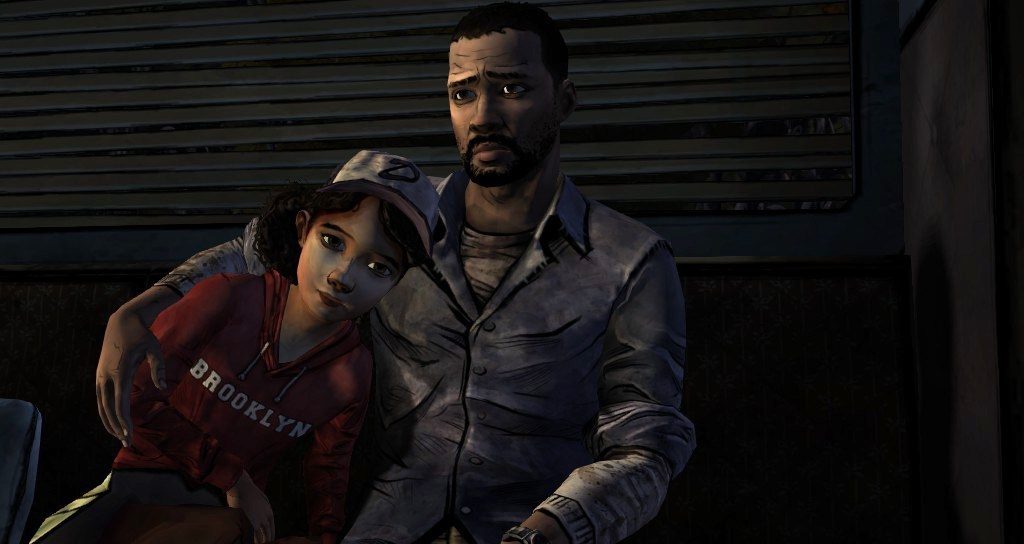
Allowing gamers to play an active role in Lee and Clementine’s fascinatingly complex adoptive-father/daughter relationship ensured the story could take on a uniquely personal dynamic. The ability to make impactful moral decisions in a game was of course by no means a new concept; but having to juggle your moral reasoning with your responsibility as a young, innocent girl’s mentor was something a little different.
Lee may have been the protagonist of Season One, but Clementine was always who the story was really about. The true importance of the decisions you made in-game rarely concerned how they advanced the core narrative, but how they influenced the young girl you were responsible for. Even if you were sure you made the right decision in the moment, seeing Clementine’s reaction to that decision could instantly change the way you felt about it.
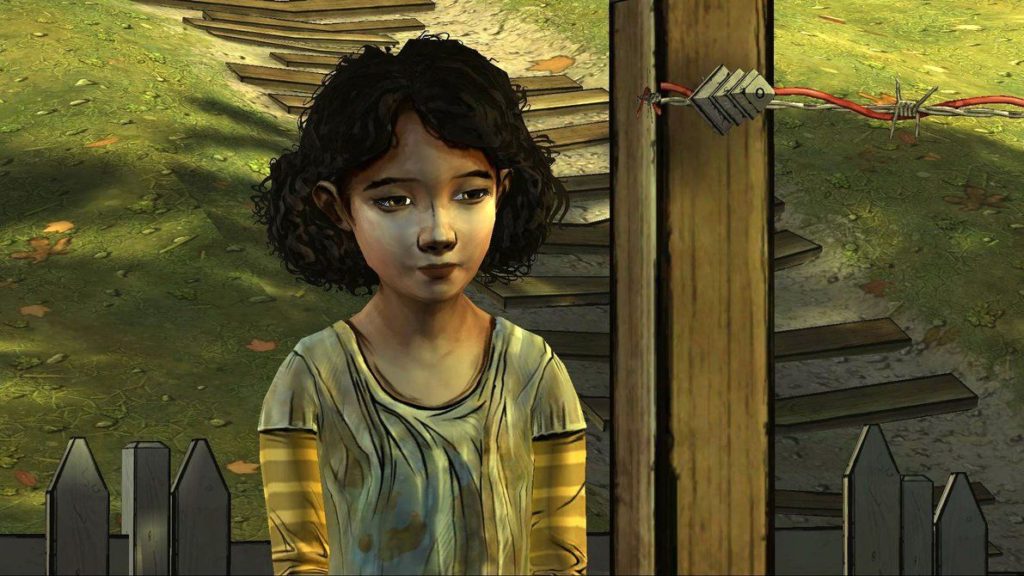
All in all, it surely cannot be refuted that the journeys the player takes as both Lee and Clementine throughout seasons 1 and 2 of The Walking Dead collectively stand as one of the greatest game stories ever told. The astounding difference between the Clem Lee finds in that treehouse at the beginning of Season One‘s premiere episode and the Clem we see clutching little A.J, walking down that cold, cold highway at the end of Season Two‘s heart-wrenching finale undoubtedly represents some of the best characterisation you can find in a game. Regardless of the ending you got; if your cheeks weren’t soaked with tears by the time Season Two‘s end credits rolled then you should probably check to make sure you’re not a robot…
#1. The Wolf Among Us (2013-14)
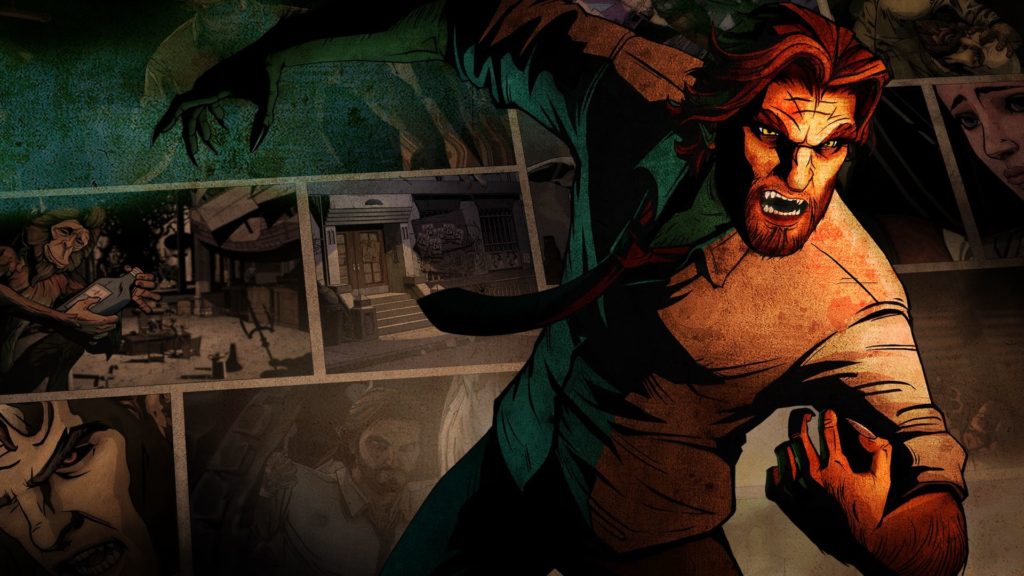
Like with any franchise, every Telltale fan no doubt has their own favourite game and their own reasons for choosing it. Whether it be the emotional intensity that defines The Walking Dead titles. Or the genius, unrelenting hilarity offered by the likes of Tales from the Borderlands and Guardians of the Galaxy. One of the Batman tales may have clinched it for those that relished the opportunity to take on the morally ambiguous role of Gotham’s enigmatic Caped Crusader. Or perhaps even one of the developer’s early classic-adventure tributes managed to win you over with its pure, untainted nostalgia. In my case, however; I apparently found myself to be in my element delving through the darkly distinct, acutely intriguing and visually entrancing world of Telltale’s mythic masterpiece that is: The Wolf Among Us.
I had not previously heard of DC Comics’ Fables series, but within minutes of sitting down to play Telltale’s adaptation of Bill Willingham’s gritty fairy-tale franchise I had already realised the adventure I was about to embark on was going to be a memorable one. Bewitched by the hypnotic noir-esque visuals, I became suddenly enveloped in this chilling aura of mystery; where an alluring fantastical element was harshly juxtaposed against a striking backdrop of grisly authenticity.
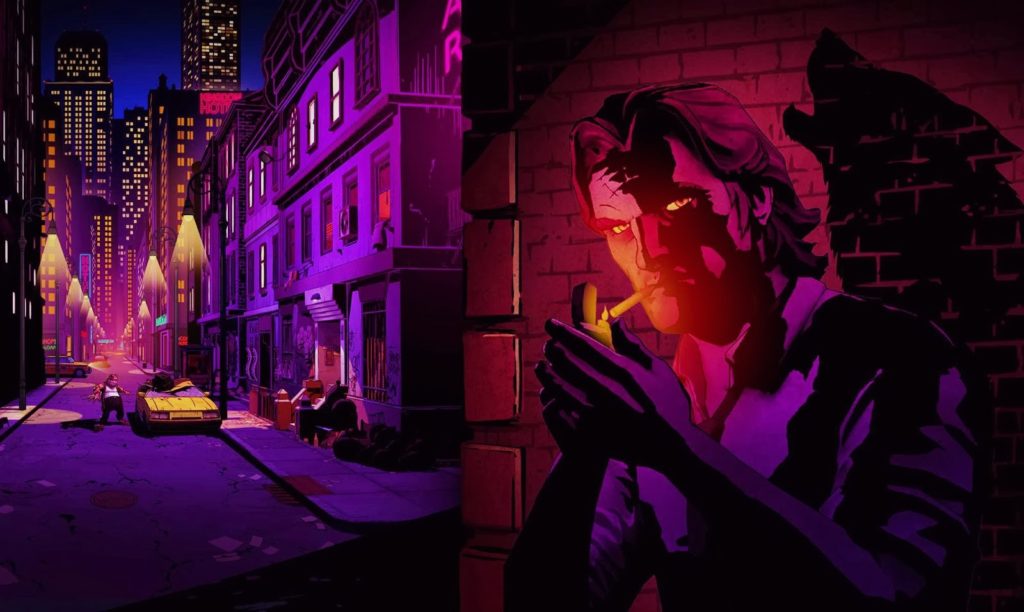
Let me set the scene: a 1980’s mustard yellow taxi cab drives through an unsettlingly empty, dimly lit New York suburb. In the backseat sits our protagonist Bigby Wolf, exhaustively resting his fingers on his temple as neon shades of pink and purple waft in through the scratched car window. Despite now being the Sheriff of this run-down neighbourhood called Fabletown, Bigby nevertheless continues to be known to most of its residents by his infamous other moniker: The Big Bad Wolf.
As the cab pulls up, Bigby steps out on to the curb. He slams the vehicle door, lights a cigarette and looks at the roughly scribbled address on his piece of paper. As his ominous silhouette steps through the entryway to the ramshackle tenement building, Bigby proceeds to greet its landlord: a rotund, foul-mouthed 3ft toad, sporting a shaggy trench coat and a plump beer-belly. After the Sheriff chastises him about not being ‘in glamour’ (magically enchanted to appear human), Mr Toad angrily insists in his gruff, Cockney accent that the cost of keeping an entire family glamoured is ‘bleedin’ him dry.’ His appeals to the Big Bad Wolf’s sentiment seem to fall on deaf ears however, and Bigby sternly warns him of the consequences should he catch Toad out of glamour again. Leaving the amphibious superintendent behind muttering crude slurs to himself, Bigby begins to climb the building stairs to investigate the sounds of a ruckus coming from the apartment above.
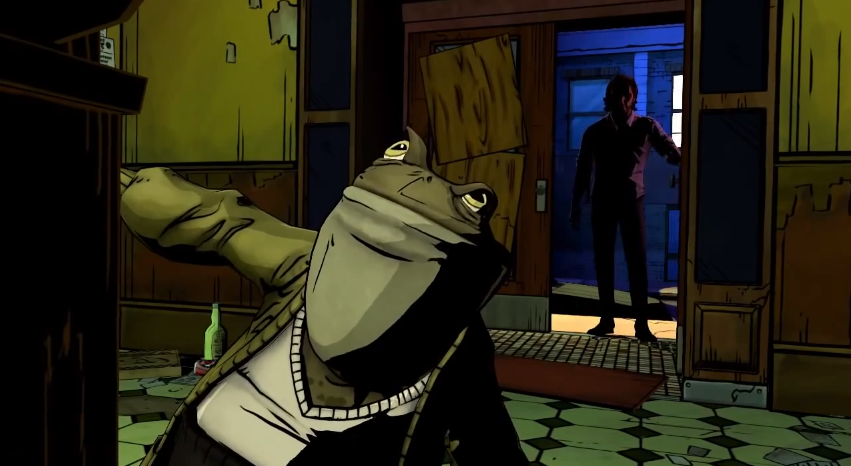
And so begins the tale of the reformed Big Bad Wolf. Now tasked with protecting his fellow residents of Fabletown, he wants nothing more than to leave his days of eating grandmothers and blowing down little pigs’ houses behind him.
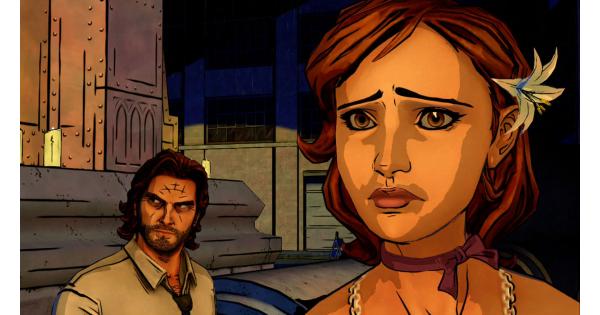
To accompany its atmospheric intrigue, the world of The Wolf Among Us was populated with a fascinating selection of wonderfully unique characters; each with their own Grimm (pun-intended) backstory and a biting personality to go with it. After being exiled from their homelands, this ragtag bunch of monarchs and monsters now had to find a way to live amongst each other in the human world. But with a richly volatile history of shifting friendships and rivalries hanging over them, leaving past feuds behind turns out to be easier said than done.
Not only was the story rife with suspense, it was also paced perfectly. Boasting plenty of scenery changes and a wealth of compelling characters, each episode proceeded to narrate its own suitably engaging self-contained story whilst also smartly advancing the series’ overarching plot. The developer also managed to deliver a gratifyingly exciting and climactic final episode – a feat Telltale often seemed to have trouble attaining.
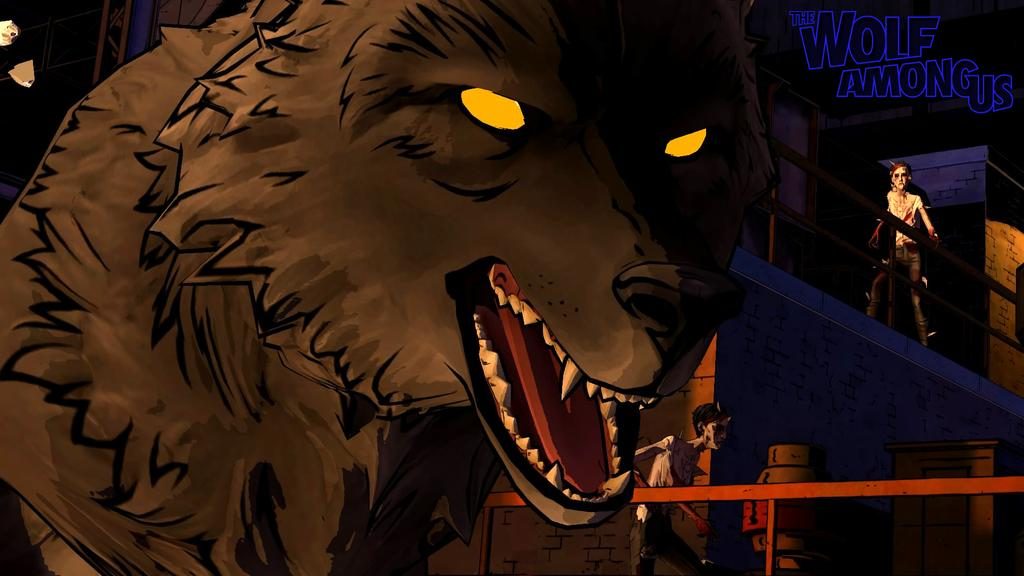
But what set the narrative experience apart from other Telltale adventures – for me at least – was the affective power the player was given over the protagonist’s core characterisation. Unlike many of Telltale’s other games, where player-decisions are generally presented as a method of ‘tailoring’ your own story, in The Wolf Among Us the true importance of your decisions was found in how they informed the development of Bigby’s character.
Did you rip off Grendel’s arm in a blind rage or stop the fight? Kill Tweedle-Dum in front of Snow or let him live? Throw the Crooked Man down the Witching Well or trust the system to deal justice? It wasn’t as much about how these decisions affected the core narrative, but how together they defined who precisely Bigby ‘was’ to the player. A reformed hero battling against his underlying animal nature for the good of his community, or a vicious anti-hero who couldn’t help but personify the adage “You can’t teach an old dog new tricks”?
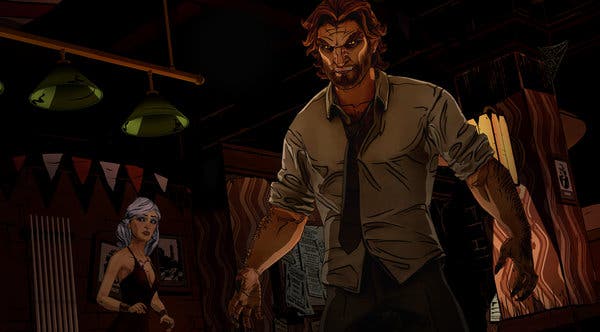
You may not have wrote the story, but through interpretation alone you decided exactly how the protagonist fit into it. While this of course essentially stood as Telltale’s mantra, in no other game is it so effectively embodied than in The Wolf Among Us. Oh God, please let there be a second season…
And there we have it; concrete proof that Telltale’s proposed revival is reason enough to start doing spontaneous cartwheels. While it may be quite some time before we get to see anything from this new developer, the promise of new content alone should be enough to put Telltale-fans’ minds at ease. In the mean time, what better time to start replaying some of the brilliant titles featured on this list?




